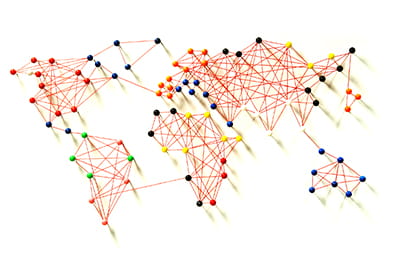GCC-EFTA Free Trade Agreement
 In an interlinked world, FTAs form an essential milestone for economic development and integration in this increasingly linked world. GCC-EFTA free trade agreement constitutes such a leap toward the expansion of economic relationship between these economic blocs. It is seen to enhance their trade in both goods and services, improve better market access to its members through this cooperation over investment and also in digital trade.
In an interlinked world, FTAs form an essential milestone for economic development and integration in this increasingly linked world. GCC-EFTA free trade agreement constitutes such a leap toward the expansion of economic relationship between these economic blocs. It is seen to enhance their trade in both goods and services, improve better market access to its members through this cooperation over investment and also in digital trade.
The GCC consists of six member states: Bahrain, Kuwait, Oman, Qatar, Saudi Arabia, and United Arab Emirates; whereas the EFTA has four constituents: Iceland, Liechtenstein, Norway, and Switzerland. This FTA, which was implemented in 2015, presents an all-round framework for trade and investments in both regions by opening further opportunities to businesses in these regions. Current developments and negotiations are constantly revising and updating the scope of this agreement, keeping it relevant to the fast-changing global environment of trade.
The FTA between GCC and EFTA nations is much more than reducing tariffs. This comprehensive agreement touches every aspect including the trade of goods and services, intellectual property rights, e-commerce, public procurement, and procedures for resolution of disputes.
For the GCC, this agreement opens access to the highly developed and competitive markets of EFTA countries, known for their innovation and advanced industrial sectors. For EFTA countries, it opens access to one of the fastest-growing regions in the world, with significant investment opportunities in energy, infrastructure, and technology.
Key Provisions of the Agreement
I. Trade in Goods
The FTA allows for the duty-free entry of industrial goods, including fish and other marine products, into the markets of the EFTA states. Most customs duties are eliminated in respect of imports into the GCC, while some products benefit from duty-free access after a transitional period of five years. Others continue to be excluded from tariff dismantling.
The tariff concessions, however, for processed agricultural products are also afforded. Bilateral agreements on basic agricultural products with the parties, and the rule of origin follow the European model using EUR.1 movement certificates. The Agreement also provides the rules on anti-dumping, state trading enterprise, subsidies, sanitary and phytosanitary measures as well as the technical regulations towards ensuring fair practice.
II. Trade in Services
The chapter on Trade in Services follows the General Agreement on Trade in Services (GATS) approach, with a positive listing of commitments. Both parties' commitments under this FTA go beyond their current obligations under the World Trade Organization (WTO). The UAE, for example, commits to further commitments in professional services, environmental services, construction, health, tourism, transportation, telecommunication, and maritime services. These commitments ensure that suppliers of services on both sides receive no less favorable treatment than that accorded to domestic suppliers in like circumstances. The agreement further aims at limiting restrictions on market access, thus facilitating business operations across borders.
III. Investment and Establishment
Investment is one of the key focuses of the agreement. The parties have agreed to initiate negotiations on non-services sectors, including agriculture and industrial investment, no later than two years from the date the agreement enters into force. This provision highlights the importance of investment in promoting economic growth and diversification. The agreement promotes the protection and promotion of foreign direct investment (FDI) by creating a stable and predictable investment environment. This is very important for both regions, as EFTA countries are increasingly interested in investing in sectors such as renewable energy, infrastructure, and technology within the GCC.
IV. E-Commerce and Digital Trade
The FTA also has a separate annex dedicated to e-commerce. This reflects the growing importance of digital trade in the global economy. The annex aims at increasing the exchange of information, cooperation, and partnership in the digital sector. The parties committed themselves to keeping track of the latest developments in digital trade and making sure there is a favorable environment for the operations of e-commerce businesses. This focus on digital trade is relevant, especially since the world relies more and more on digital solutions in trade and commerce, and especially in a post-pandemic world. The agreement would ensure that the two regions are able to share the benefits from technological advancements and digitalization.
V. Intellectual Property Rights (IPR)
The parties reaffirm their commitment to the WTO Agreement on Trade-Related Aspects of Intellectual Property Rights (TRIPS). They have also agreed to conclude negotiations on an annex related to IPR no later than two years after the agreement enters into force. Until then, a special consultation mechanism is in place to address any issues related to IPR that may affect trade conditions. This provision ensures that intellectual property protection remains a priority, fostering innovation and creativity in both regions.
VI. Government Procurement
The FTA provides for a chapter on government procurement, where clear rules and principles of access to the market and transparency are established. Companies from GCC states can participate in EFTA states' government tenders and vice versa without any form of discrimination. This chapter is set to improve competition, increase transparency, and provide new opportunities in businesses. It outlines procedures for government entities procuring goods, services, and construction services above certain thresholds and ensure fair access to public procurement markets.
VII. Competition and Fair Trade Practices
The treaty addresses anti-competitive business practices that may hinder trade between the parties. The parties have agreed to adopt or maintain competition laws that will avert such practices and ensure fair competition. There is a mechanism of consultation to ensure cooperation by the parties in the enforcement of competition law. There is a joint committee which monitors the provisions on competition especially for parties which have not adopted competition laws into force.
VIII. Dispute Resolution and Administration
It shall be administered jointly by a joint committee, monitoring its implementation process and furthering its development for smooth implementation of the agreement. The committee could take decisions concerning matters provided under the agreement or make recommendations for other matters under consideration. Dispute resolution provides a comprehensive arrangement for amicably and reasonably resolving disputes to ensure that any dispute does not hinder trade or investment flows in the regions.
 Recent Developments and Ongoing Negotiations
Recent Developments and Ongoing Negotiations
Talks have been on-going to renew and broaden the scope of the GCC-EFTA FTA. The aim is to reach a new, contemporary, and commercially relevant agreement in light of the present international trading context.
UK-GCC Free Trade Talks
The UK has held talks with the GCC since it announced its post-Brexit trade policy. The discussions were resumed on 24 September 2024. The UK and GCC negotiating teams have conducted virtual and physical meetings.
The areas of focus include the following:
i. Services, Investment, and Digital Trade: Technical talks have converged the outstanding issues in the text. Here, specific focus is placed on the mobility and market access for business people.
ii. Goods Market Access: Negotiators have aimed for outcomes that are commercially meaningful, discussing the rules of origin and trade remedies.
iii. Sustainable Trade: Environmental and labor standards discussions have moved ahead in order to make trade sustainable and socially responsible.
Economic Impact and Future Prospects
A mutually beneficial FTA between GCC and EFTA states will stimulate economic growth to a greater degree, generate new jobs, and attract new investments. Businesses may look forward to new market openings, trade barrier reductions, and greater predictability in the country's trade and investment policies. The GCC’s growing importance as a global economic hub and EFTA’s reputation for innovation and competitiveness make this partnership highly strategic. Enhanced cooperation in areas such as technology, renewable energy, and infrastructure will drive economic diversification and resilience in both regions.
The FTA is being constantly updated to meet the emerging trade challenges and opportunities, ensuring that the agreement remains relevant and impactful. This includes expanding cooperation in digital trade, strengthening environmental and labor standards, and promoting sustainable development.
 Conclusion
Conclusion
The Free Trade Agreement between the Gulf Cooperation Council and the European Free Trade Association is an important instrument for strengthening economic relations between these two regions. The agreement reduces trade barriers, fosters investment, and promotes cooperation in key sectors, unlocking significant opportunities for businesses and contributing to long-term economic growth. While negotiations continue in updating and expanding the scope of the FTA, both parties remain committed to reaching a modern, future-proof agreement that captures better the emerging contours of the global trade landscape. The GCC-EFTA FTA-which includes broad provisions and focuses on sustainable development-is all set to contribute to the two regions' economic futures.
 English
English
 عربي
عربي Русский
Русский 官话
官话 português
português
 Türk
Türk 










